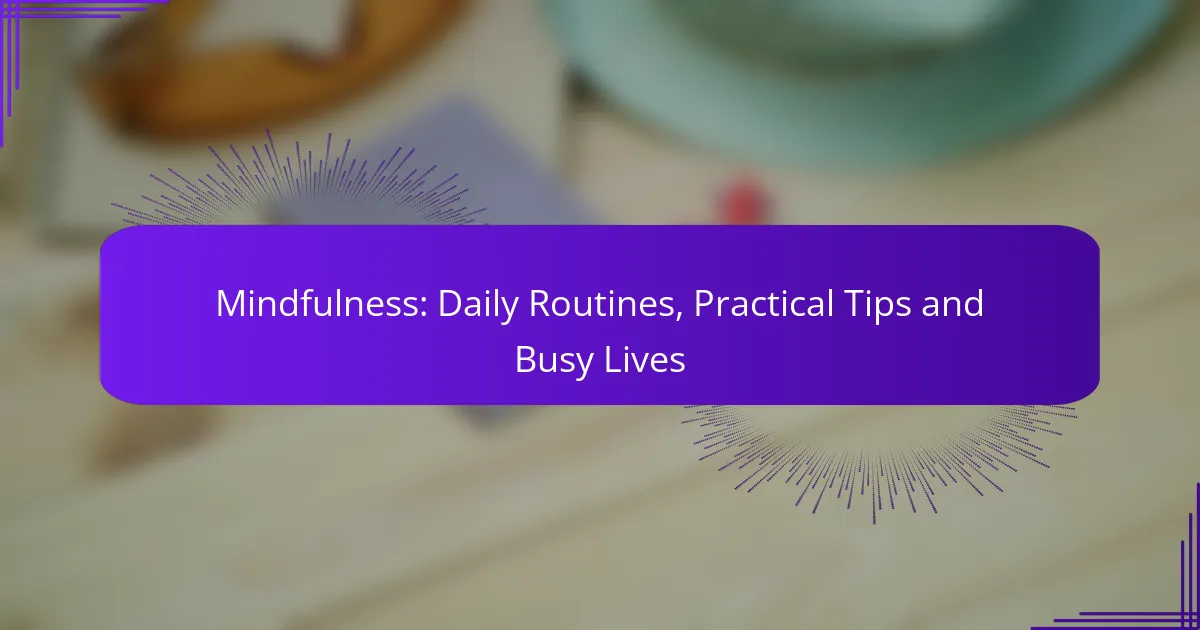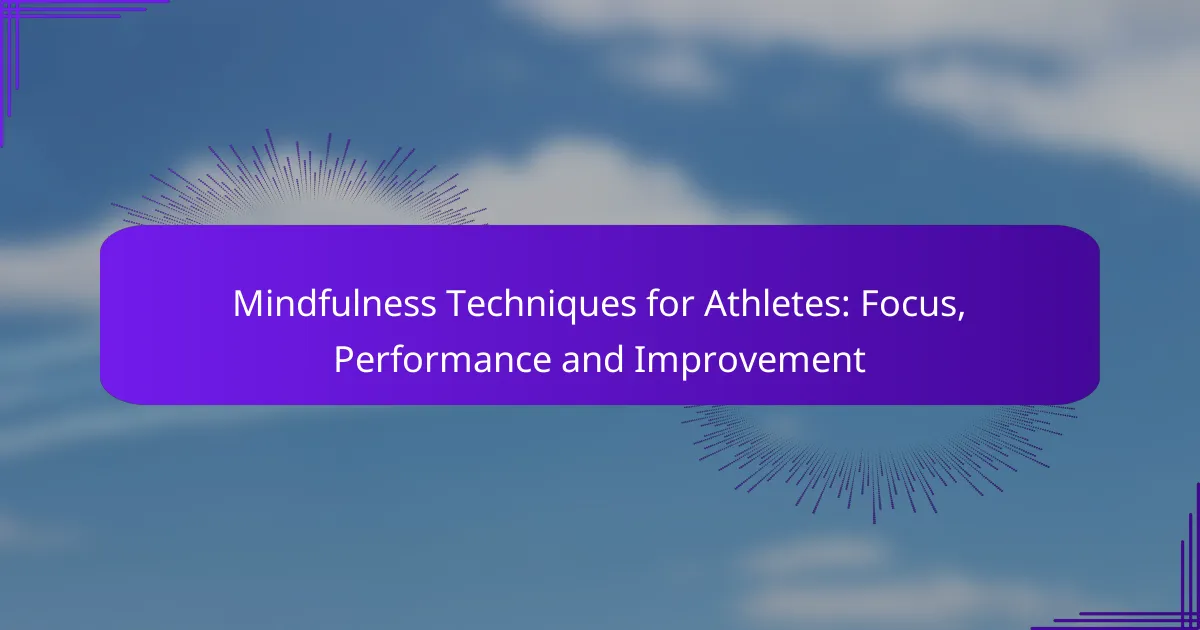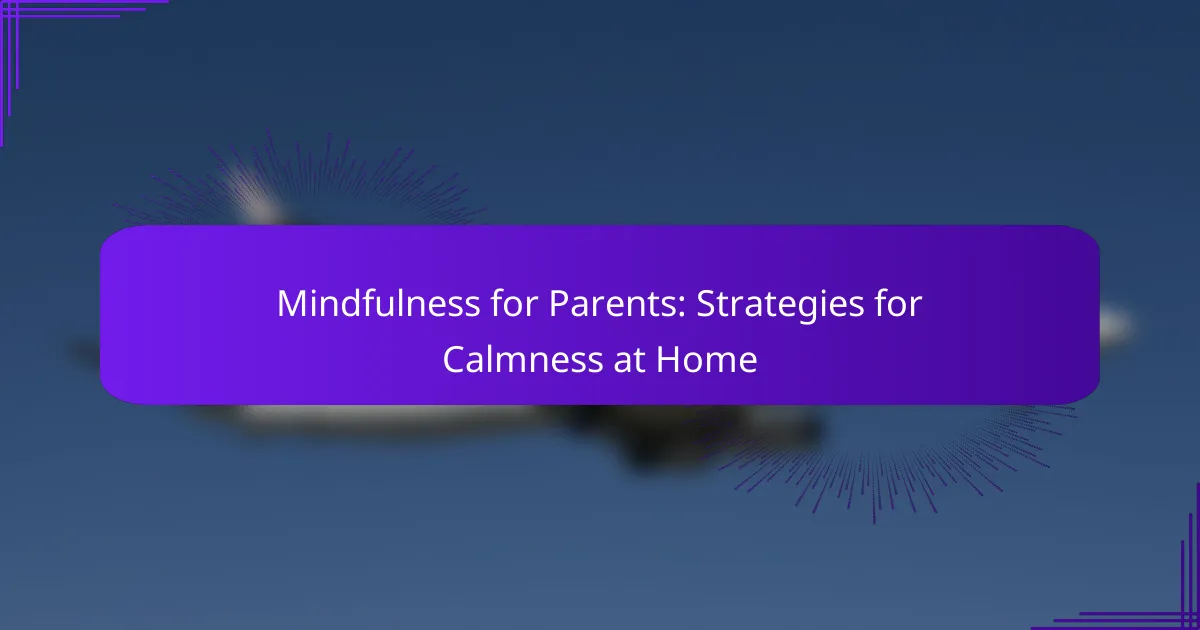In today’s fast-paced world, mindfulness offers a powerful way to enhance daily routines by promoting awareness and presence in each moment. By integrating simple techniques into busy lives, individuals can effectively manage stress and cultivate a sense of calm, ultimately improving their overall well-being.
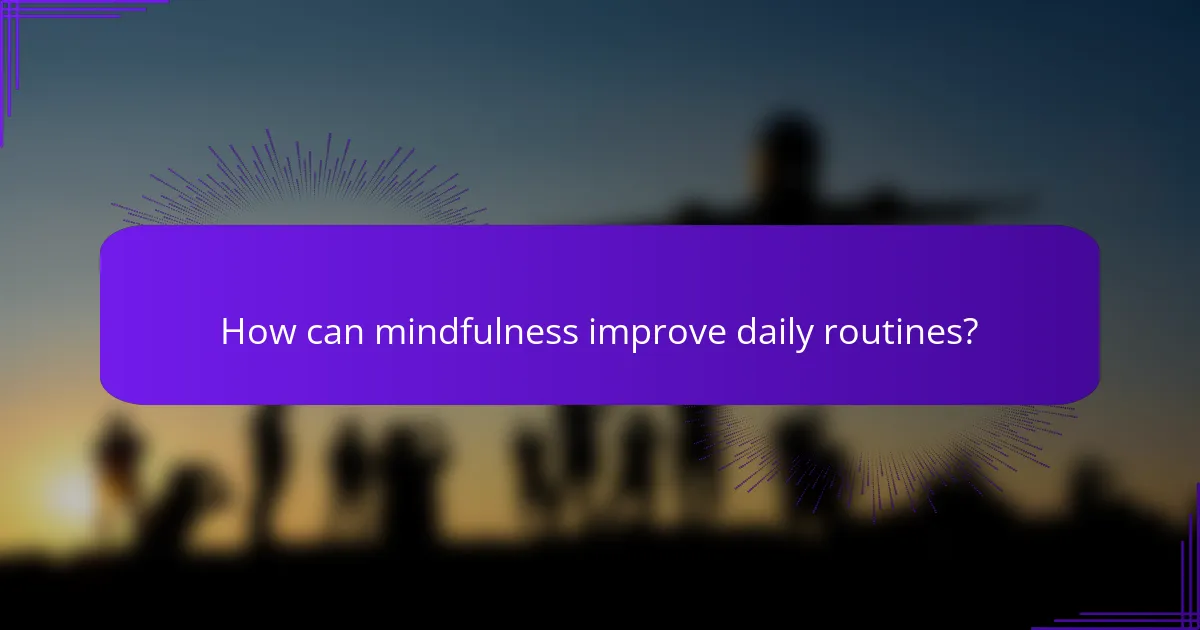
How can mindfulness improve daily routines?
Mindfulness can significantly enhance daily routines by fostering greater awareness and presence in each moment. This practice helps individuals manage their time and energy more effectively, leading to improved overall well-being.
Enhanced focus and productivity
Mindfulness sharpens focus by training the mind to concentrate on the present task, reducing distractions. Techniques such as mindful breathing or short meditation sessions can be integrated into work breaks, allowing for clearer thinking and better decision-making.
To boost productivity, consider setting specific times for focused work, followed by brief mindfulness exercises. This approach can help maintain high levels of engagement and efficiency throughout the day.
Reduced stress and anxiety
Practicing mindfulness can lower stress and anxiety levels by promoting relaxation and a sense of control. Engaging in mindfulness techniques, such as body scans or guided imagery, can help individuals respond to stressors with a calmer mindset.
Incorporating mindfulness into daily routines can be as simple as taking a few minutes each morning to set intentions or practicing gratitude. These small changes can lead to a more balanced emotional state over time.
Improved emotional regulation
Mindfulness enhances emotional regulation by increasing awareness of one’s thoughts and feelings. This awareness allows individuals to respond to emotions more thoughtfully rather than reacting impulsively.
To improve emotional regulation, practice mindfulness during challenging situations. Techniques like pausing to breathe before responding can help create a space for reflection, leading to more constructive outcomes in interpersonal interactions.
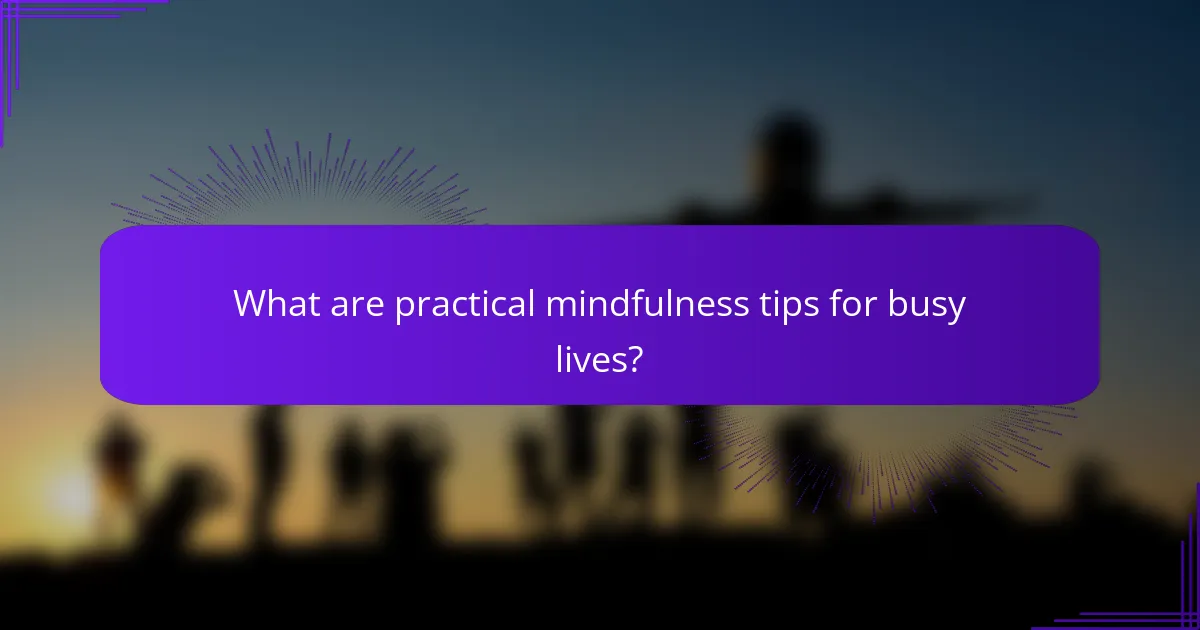
What are practical mindfulness tips for busy lives?
Practical mindfulness tips for busy lives focus on integrating simple techniques into daily routines to enhance awareness and reduce stress. These strategies can be easily incorporated into tight schedules, allowing individuals to cultivate a sense of calm amidst their hectic lifestyles.
Five-minute breathing exercises
Five-minute breathing exercises are quick techniques that can help ground you during a busy day. Find a quiet spot, sit comfortably, and focus on your breath. Inhale deeply through your nose for a count of four, hold for four, and exhale through your mouth for a count of six. Repeat this cycle for five minutes.
To enhance effectiveness, consider using a timer or a mindfulness app that offers guided breathing sessions. This can help you stay focused and make the most of your limited time.
Mindful walking techniques
Mindful walking techniques involve paying attention to each step you take, transforming a simple walk into a meditative practice. As you walk, focus on the sensation of your feet touching the ground and the rhythm of your breath. This can be done during a break at work or while commuting.
Try to eliminate distractions by leaving your phone behind or using headphones with calming music. Aim for at least 10 minutes of mindful walking to fully engage with the experience and clear your mind.
Incorporating mindfulness into meals
Incorporating mindfulness into meals means being fully present during eating. Start by setting aside distractions like phones or television, and take a moment to appreciate the food’s colors, textures, and aromas before you begin. Chew slowly and savor each bite, focusing on the flavors and sensations.
Consider practicing this during one meal a day, gradually increasing to more meals as you become comfortable. This approach not only enhances your eating experience but can also promote healthier eating habits and better digestion.
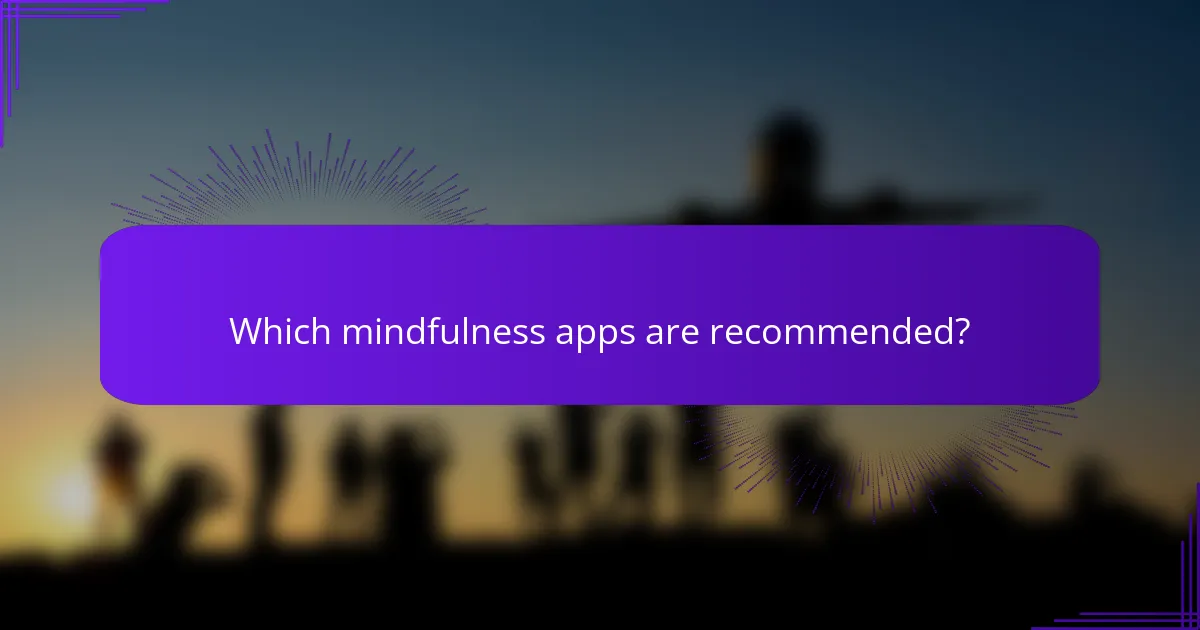
Which mindfulness apps are recommended?
Several mindfulness apps stand out for their effectiveness and user-friendly features. Headspace, Calm, and Insight Timer are among the most recommended, each offering unique tools to enhance mindfulness practices.
Headspace for guided meditations
Headspace is well-known for its structured approach to guided meditations, making it ideal for beginners. The app offers a variety of themed sessions, ranging from stress relief to focus enhancement, often lasting between 10 to 30 minutes.
Users can track their progress and set reminders, which helps in establishing a consistent meditation routine. The app also includes animations and articles that explain mindfulness concepts, enriching the user experience.
Calm for sleep and relaxation
Calm specializes in promoting better sleep and relaxation through soothing sounds and sleep stories. It features a diverse library of content, including guided meditations that focus on sleep, anxiety reduction, and overall well-being.
The app’s calming interface and gentle background music can help users unwind after a busy day. Many users appreciate the sleep stories narrated by well-known voices, which can enhance their nighttime routines.
Insight Timer for community support
Insight Timer offers a vast library of free meditations and a strong community aspect, making it unique among mindfulness apps. Users can connect with others through group meditations and discussions, fostering a sense of belonging.
The app features thousands of guided sessions from various teachers, allowing users to explore different styles and techniques. Its social features, such as friend connections and community groups, encourage users to stay motivated and engaged in their mindfulness journey.
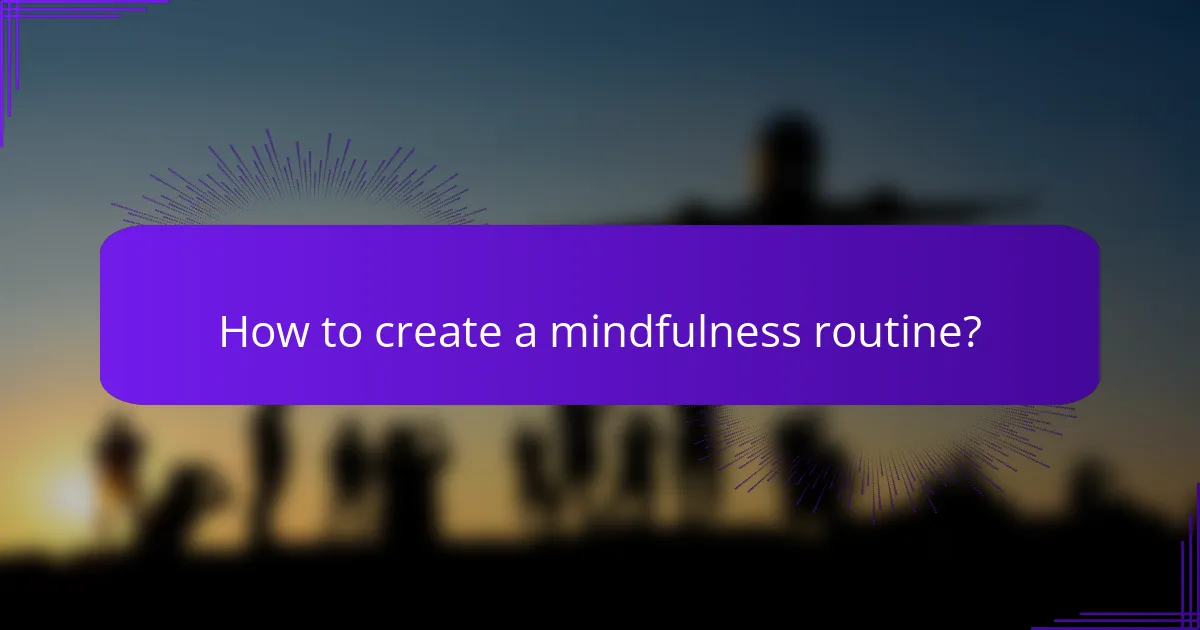
How to create a mindfulness routine?
Creating a mindfulness routine involves incorporating intentional practices into your daily life that promote awareness and presence. Focus on consistency and simplicity to make mindfulness a natural part of your day.
Morning mindfulness practices
Morning mindfulness practices can set a positive tone for the day. Start with a few minutes of deep breathing or meditation to ground yourself before engaging in daily activities.
Consider incorporating gentle stretching or yoga to awaken your body and mind. Aim for 5-15 minutes of these practices to enhance clarity and focus throughout your day.
Evening reflection techniques
Evening reflection techniques help you unwind and process the day’s events. Spend 5-10 minutes journaling about your experiences, feelings, and any lessons learned.
Alternatively, practice gratitude by listing three things you appreciated that day. This can foster a positive mindset and improve your overall well-being.
Weekly mindfulness check-ins
Weekly mindfulness check-ins allow you to assess your mental and emotional state. Dedicate 15-30 minutes each week to reflect on your mindfulness practices and their impact on your life.
Consider using a simple checklist to evaluate areas such as stress levels, emotional balance, and overall satisfaction. Adjust your routine based on these insights to enhance your mindfulness journey.
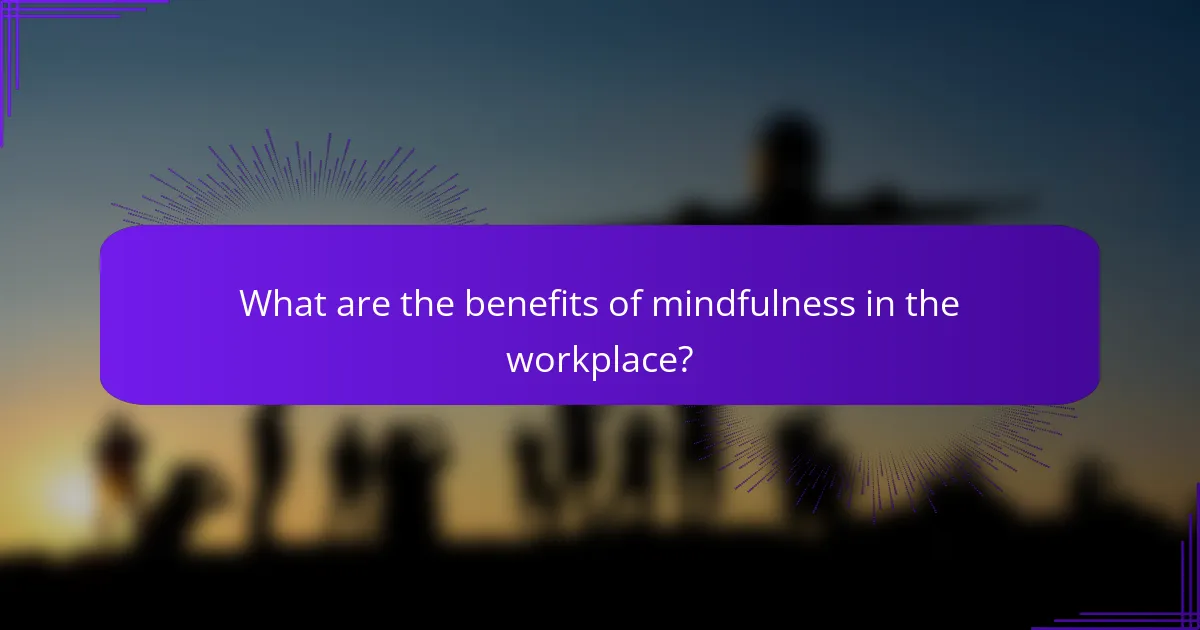
What are the benefits of mindfulness in the workplace?
Mindfulness in the workplace enhances focus, reduces stress, and improves overall employee satisfaction. By integrating mindfulness practices into daily routines, organizations can foster a healthier work environment that promotes productivity and collaboration.
Increased employee well-being
Mindfulness practices can significantly boost employee well-being by reducing stress and anxiety levels. Techniques such as meditation, deep breathing, and mindful breaks help employees manage their mental health, leading to improved job satisfaction and lower absenteeism.
Organizations can implement mindfulness programs or workshops to encourage participation. Simple practices, like a five-minute breathing exercise before meetings, can create a more relaxed atmosphere and enhance focus.
Enhanced team collaboration
Mindfulness fosters better communication and collaboration among team members. When employees practice mindfulness, they become more present and attentive, leading to improved listening skills and empathy in interactions.
To enhance team collaboration, consider incorporating regular mindfulness sessions into team meetings. This can help create a shared sense of calm and focus, allowing for more effective brainstorming and problem-solving. Additionally, setting aside time for team-building mindfulness activities can strengthen relationships and trust within the group.
